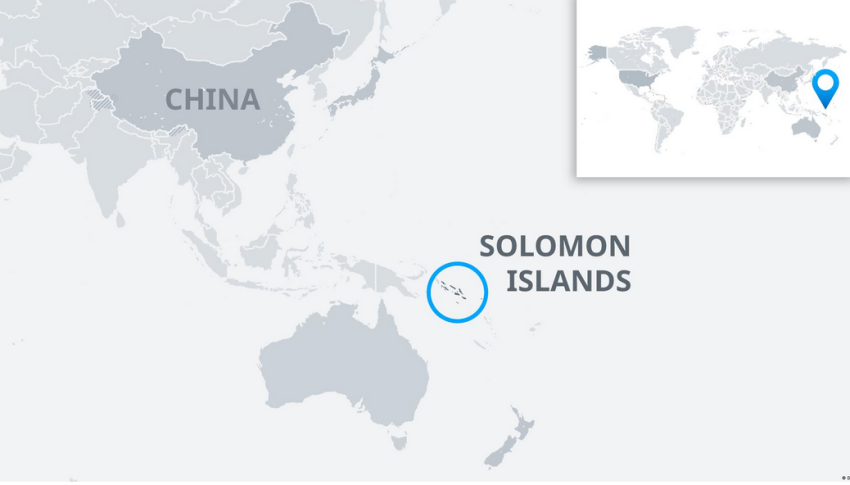
Australia’s initial effort to convince the Solomon Islands that its decision to make a security pact with Beijing was simply not appropriate was part plea, part threat.
Senator Zed Seselja found time, despite the election campaign, to tell Prime Minister Manasseh Sogavare that Canberra remained dedicated to supporting the security needs of the Solomon Islands, and would do so “swiftly, transparently and with full respect for its sovereignty”. The country remained part of the “Pacific family”, he said, before urging the Solomon Islands to reject the security pact with China.
Honiara did not change course, prompting a range of overblown reactions.
David Llewellyn-Smith, former owner of the Asia Pacific foreign affairs journal The Diplomat, took leave of his senses by suggesting that a Chinese naval base in the Solomon Islands would lead to “the effective end of our sovereignty and democracy”. He suggested this was “Australia’s Cuban missile crisis”.
The Labor Party said it is one of the greatest intelligence failures since the World War II. Leader Anthony Albanese, seeking some safe mooring in a lacklustre campaign, was particularly strident. “The security agreement between China and the Solomons is a massive failure of our foreign policy … We are closer here today to the Solomon Islands than we are to Perth. That shows how strategic they are to Australia.”
His belligerent note might have been stronger were it not for his deputy, Richard Marles, previously suggesting the Pacific islands were sovereign entities and needed to be treated as such and that China’s offer of development assistance should be “welcome”.
Rupert Murdoch’s News Corporation responded by seeking to find a Chinese “Red” under Marles’ bed.
Labor said it was inappropriate to have only sent a junior minister and that Foreign Minister Marise Payne should have gone to bully the Solomon Islands into submission.
The message being fanned is that deputy sheriff Canberra failed, leaving it to the United States. “The United States very much relies upon Australia and sees Australia as playing that key role in the Indo-Pacific”, lamented Albanese. “Australia and Scott Morrison have gone missing.”
The government poured water on that by suggesting a fair share of oriental deviousness was at play. Not only had Defence Minister Peter Dutton been advised by intelligence to not attack the security pact, the agreement was the product of bribery. Responding to a question by Radio 3AW host Neil Mitchell Dutton, Dutton said: “You asked the question about bribery and corruption – we don’t pay off, we don’t bribe people, and the Chinese certainly do.”
This clean-linen view of Canberra’s conduct ignores such inglorious chapters as the oil-for-food scandal, in which the Australian Wheat Board paid $300 million in kickbacks between 1999 and 2004 to the Iraq regime via Alia, a Jordanian trucking company. These arrangements, which breached UN Security Council sanctions imposed after Baghdad’s invasion of Kuwait in 1991, were unmasked in 2005.
Australia’s failure to change minds in Honiara led to the paladins of the US imperium being sent in. US President Joe Biden’s National Security Advisor Jake Sullivan, Assistant Secretary of State for East Asian and Pacific Affairs Daniel Kritenbrink and National Security Affairs Indo-Pacific chief Kurt Campbell all travelled to the small Pacific Island state.
National Security Council spokesperson Adrienne Watson struck a bullying tone, oblivious to the fact that the Solomon Islands was not a protectorate of the Five Eyes. Officials from the US, Japan, New Zealand and Australia had “shared concerns about [the] proposed security framework between the Solomon Islands and the People’s Republic of China (PRC) and its serious risks to a free and open Indo-Pacific.”
The Washington Post tried to speak some home truths about an empire facing decline. The unipolar world that came into being after the demise of the Soviet Union had ended, Henry Olsen wrote. “Our adversaries can fight back, and they are increasingly using every means at their disposal to push back against American influence.”
While the Solomon Islands is divided on the security deal with China, Sogavare is unrepentant. He told parliament that he had no intention “to ask China to build a military base in Solomon Islands”. He said he felt “insulted” by such suggestions and that there was only one side to pick — “our national security interest”.
Danny Philip, his confidant and a former Prime Minister, reminded critics they should know better. “People in Australia know very little about Pine Gap in the middle of the desert, the military base of the United States.” There were “agreements that open up all major ports in Australia that are not being seen by all the citizens of that country,” he said.
Pre-emptive action on the part of Australia, possibly with help from the United States, cannot be ruled out. Some are even encouraging invasion and regime change in Honiara.
David Llewellyn-Smith, a former Sydney Morning Herald and Age commentator, said Australia “should invade and capture Guadalcanal such that we engineer regime change in Honiara”.
“This is Australia’s Cuban missile crisis … This is your chance to actually do something real for once and to dramatically turn your election fortunes while you’re at it,” Llewellyn-Smith frothed. “It is your Tampa, only this time for real. Force a direct confrontation with Beijing over the Solomons using any and all means necessary. Get the backing and military support of Washington and drive China out of the South Pacific.”
[Dr Binoy Kampmark lectures at RMIT University.]